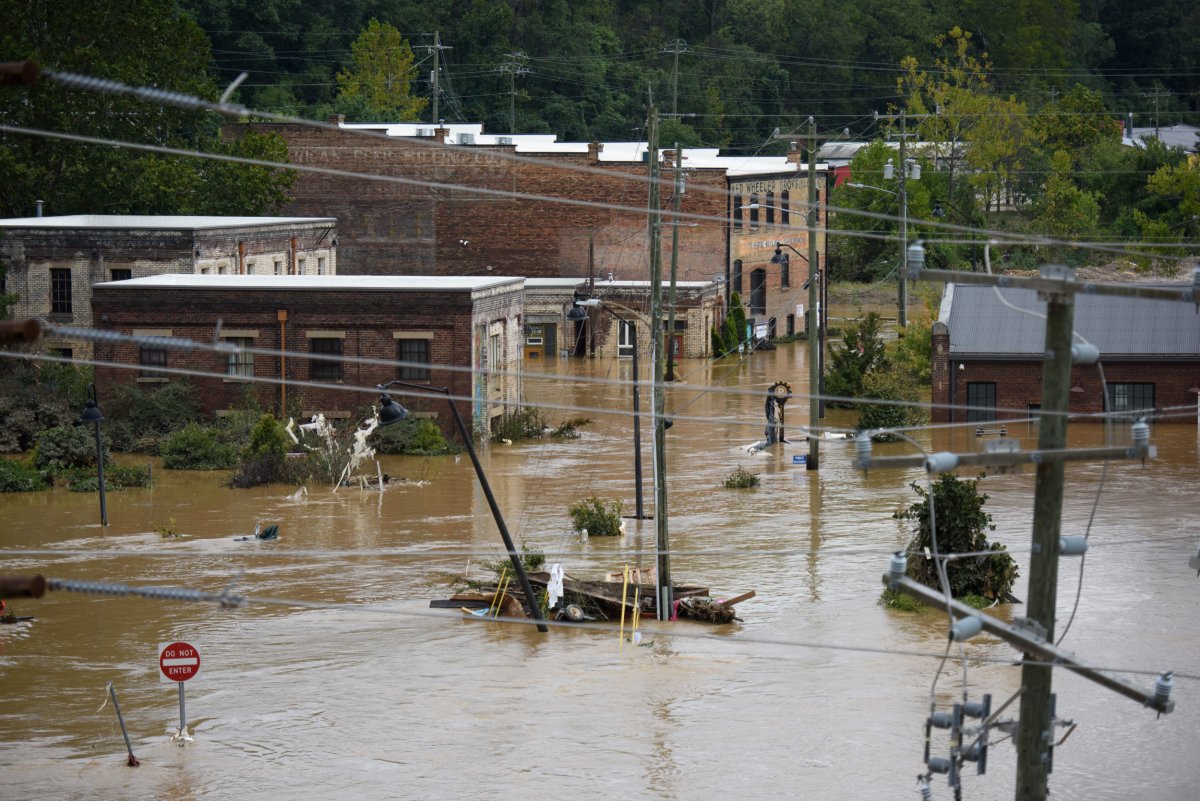There are fears a nationwide shortage of IV fluid and dialysis products could hit patients across the country after a major manufacturer was knocked out by Hurricane Helene.
Baxter International Inc., a medical technology company that supplies IV drips and peritoneal dialysis solutions to most U.S. hospitals, was forced to temporarily stop making the products at its North Cove site in Marion, North Carolina, due to flooding sparked by the storm.
IV (intravenous) fluid is a specially formulated liquid that is injected into a patient’s vein to deliver nutrients and hydration directly into the bloodstream, while peritoneal dialysis solutions are administered to patients suffering from kidney failure, to remove waste from their blood. Before the storm halted production, the American Hospital Association said the plant produced 1.5 million IV bags per day, which equates to 60 percent of the country’s supply.

Heavy rains from hurricane Helene caused record flooding and damage on September 28, 2024, in Asheville, North Carolina. There are fears a nationwide shortage of IV fluid and dialysis products could hit patients across the country after a major manufacturer was knocked out by Hurricane Helene.
Melissa Sue Gerrits/Getty Images
The development comes amid the destruction caused by Hurricane Helene, which killed at least 225 people after smashing into the U.S. on September 26. The fierce winds destroyed buildings, while heavy rains, storm surges, and flooding took out many more, and millions of homes and businesses were left without power. North Carolina was particularly badly affected, with 30 inches of rainfall reported in some areas, sparking the worst local flooding in recorded history.
In a statement issued on September 29, Baxter said its North Cove facility was “currently closed for production.”
“The company is working around the clock in close coordination with local, state and federal officials to assess the extent of the damage and implement a plan to bring the plant back online as quickly as possible to help mitigate supply disruption to patients,” it siad.
Gregory Pauly, president of Duke University Hospital in Durham, North Carolina, told local newspaper The News & Observer that staff were trying to ration their use of the affected products where possible and when safe to do so medically. “Our teams have been working to assess inventory, deploy conservation strategies, and triage future distribution in an equitable manner across the health system,” he said.
North Cove, which opened in 1972, is the company’s largest manufacturing facility with more than 2,500 employees working there. Before the hurricane hit, Baxter had evacuated staff and moved products to higher ground or secure storage locations where possible. However, the heavy rain dumped on the area by Helene triggered a levee breach, which led to water “permeating the [Baxter] site” while bridges accessing the facility were also downed.
Talks between Baxter and its hospital customers are now underway, with the firm hoping to use its global manufacturing network in an attempt to mitigate potential supply problems. Baxter said it is working with the Food and Drug Administration (FDA) to leverage the manufacturer’s global supply network as it works to restore operations at North Cove. A spokesperson from the Department of Health and Human Services said the government is focused on reducing supply chain disruptions and told NBC that two other IV fluid manufacturers were stepping up their production to ensure additional supply.
“Our hearts and thoughts are with all those affected by Hurricane Helene,” said José E. Almeida, chair, president and chief executive officer at Baxter. “The safety of our employees, their families, and the communities in which we operate remains our utmost concern, and we are committed to helping ensure reliable supply of products to patients. Remediation efforts are already underway, and we will spare no resource—human or financial—to resume production and help ensure patients and providers have the products they need.”
A new update issued by the company on Monday said Baxter is battling to avert the potential shortages and has now managed to start supplying hospitals again this week. It is hoped production can resume at the plant in due course because electrical power and the local aquifer (the source of the water used in the manufacturing process) are working and there appears to be no structural damage to the site, the company said.
“We have resumed shipments to hospitals and dialysis patients after the temporary hold last week, based on allocations as previously communicated,” the firm said. “We have moved finished goods from our North Cove site that were not impacted by the storm and are inspecting other finished goods onsite. This inventory will be used to support current allocations in the short term. Several of our global plants are scaling and ramping production to help meet U.S. needs, and we expect to receive product from these sources throughout the month of October. We will communicate adjustments to allocations within the next two weeks as we assess timing of inbound products and shipments.”
In a sign of just how catastrophic Helene’s impact was, the firm also said that it is still unaware of the fate of some of its workers. “The vast majority of employees are accounted for,” Baxter said, but added that “we are still working to reach a small number of our colleagues.” The plant has continued paying its staff during the site’s closure and said: “Outreach to those employees in remote locations, where people are having difficulty getting out of their homes due to damaged roads and bridges, continues door-to-door on ATVs. Supplies, electricity, and cell service remain very limited in the area. We are helping our employees and the community through our Employee Support Center located a few miles from our plant.”
Newsweek has reached out by email to Baxter seeking further information and comment.




